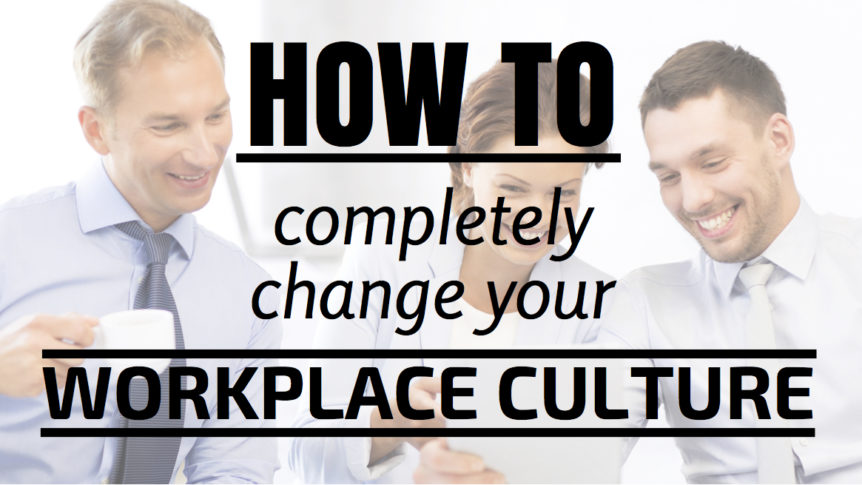In order to change your workplace culture, we must first understand the meaning of workplace culture. This new paradigm for the workplace has been a common topic of discussion in the last decade and it will only continue to evolve with time. We would also like to take into consideration a different perspective of workplace culture. The more you understand why it exists, the easier it will be to implement the changes you would like to see in your business.
The Paradigm
If you haven’t watched Simon Sinek’s take on Millennials then we strongly urge you to watch this interview – https://www.youtube.com/watch?v=hER0Qp6QJNU
If you don’t have a spare 15 minutes, not to worry, we will summarise a lot of his points in this short paragraph. Millennials are the catalyst for this shift towards a workplace culture we see more commonly today. You know the culture where there’s pool tables, table tennis tables, bean bags, food and massages provided. Well, Simon puts it perfectly. This new generation has had full control over this sense of entitlement, hence the outcome of these perks we see more commonly in businesses today.
Why? It’s all to do with the psychology of this generation. Unfortunately, Simon believes those born within the age brackets of Millennials had ‘no hope’ to put it frankly. The parents of this generation sugar coated everything as well as the schooling system we operate under. Therefore when people jump into the workforce, there’s minimal understanding of giving to the business. Millennials feel as though they deserve to work in a work environment full of benefits for their well-being and run away from failure. . Think about Google (cliche answer) or the owners of Facebook. These companies are run by millennials who have created these working environments, setting a higher benchmark and resulting in millennials feeling this is the standard across the board. Simon talks about the responsibility companies now have to ensure this generation don’t lose the sense of human touch. That is, not sitting on phones prior to a meeting and building trust within teams by empowering their team to physically talk to their colleagues face to face. Building this trust within the workplace will build something greater than materialistic objects and games ever could.
Your workplace culture
What would you say your workplace culture is like? What makes your culture different to the next company? Do you really understand what your culture is? What would your team say about your culture? These are very important questions you need to take into consideration if you are seeking to change your workplace culture. You must understand what you have in order to change it to something new. We don’t want you to waste your time recreating something just for it to be the same. Your workplace culture can be your fingerprint in the business world if you want it to be. Have a think about what you give your team in terms of superficial perks and benefits. What do they consist of? Now have a think about the meaningful tasks you complete with your team. We will go into detail about incorporating meaning into work and leadership shortly.
It’s all well and good to have the bean bags, the ‘chill-out’ zones and the slide instead of the stairs but what is your culture really comprised of? We have created subcategories based on theories and ideas from some of the best.
Meaningful Work
Dan Airley, Professor of Psychology and Behavioral Economics, describes meaningful work clearly in some research and studies he has conducted in workplaces. Essentially, meaningful work comes down to what it means to the individual by how much effort they have put into the work, what it means for the company once the work has been completed and what it means overall in its entirety. Particular studies have shown that remuneration acts as a form of motivation and incentive for people, however when the work they completed was pulled apart for them to see, they slowly pulled away from continuing the work. For example, Airely’s experiment was to determine how far people would go for money vs. meaning.
Happiness and Positivity
What are you doing in your workplace to ensure there are positive vibes and happiness amongst all? Shawn Anchor, an American happiness researcher, author, and speaker known for his advocacy of positive psychology, looked at various workplaces and applied simple yet effective science to building a strong workplace culture. It’s based on happiness. Anchor, amongst many others, found that productivity and efficiency are indeed linked to happiness and positivity. He analysed people in the workforce and the companies who encouraged their team, gave positive feedback and overall ensured their team were happy within their roles were far more productive and had higher profits.
Be Active
I like to move it move it, I like to move it move it, you like to MOVE IT! That’s right guys, studies have shown the long-term adverse effects of sitting at desks for as long as we do. On average, it’s 9 hours a day, according to business innovator Nilofer Merchant. She explains we spend less time in bed sleeping and more time sitting at a desk. It’s all in the science! People have died from obesity, heart disease and other cardiovascular issues due to the lack of exercise and movement they give their bodies. Sitting down can actually kill you! Some business owners have adopted the idea of walking and talking and we couldn’t agree more! We encourage you to move your meetings outside. Go for walks with your team and get them active during lunch breaks. Create mini competitions and have your team complete as many as 10,000 steps in a day so they have the motivation to park further, walk at lunch and move their body throughout the day. It increases productivity, focus and health!
Leadership
You’re probably wondering how leadership falls into the culture. It actually plays a crucial role in the entire process! How effective are your leaders? What are they doing differently to other leaders in other businesses? Leadership isn’t just about managing your team and giving them direction or setting an example. A strong leader will give their team a sense of purpose, empowerment and accomplishment. How? It all comes down to the way your leaders engage with their team. A great leader will sit down with each employee and get to know them, understand their personal and professional goals and assist them in working towards something meaningful. This is a common trend in Simon Sinek’s talks and research. In a TED Talk, he talks about how great leaders make their team feel safe and earn their trust. Trust isn’t something that just happens. It is built over time.
All in all, the overall culture needs to go deeper than what we see on the surface. Video games in the office, amazing break areas, pool tables, ping pong etc. These are all superficial products and in order to build a stronger culture, it really does need to have meaning, happiness, positivity, activity and strong leadership. We suggest evaluating your company within these areas and work towards building a culture based on these merits. Not only will it be stronger, but it will be like no other! That’s why you’re in business, isn’t it?

